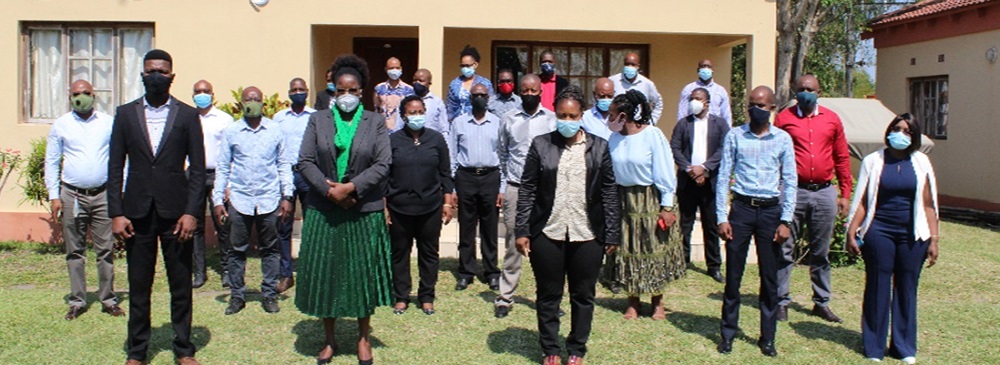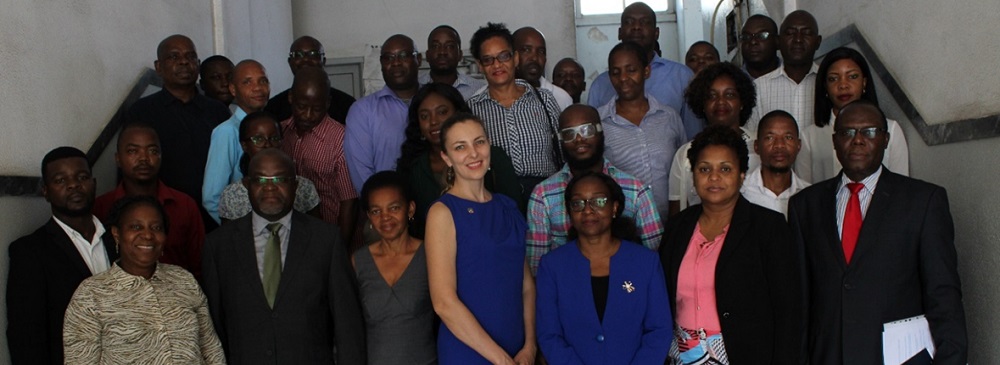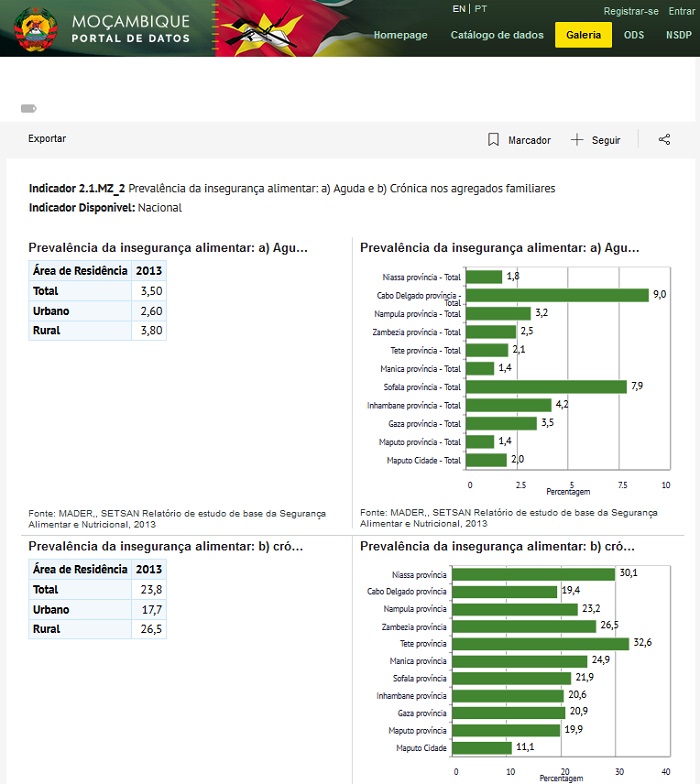Mozambique
I. General on SDG monitoring set up
National SDG organizational set up
The National SDG Reference Group, established in 2018, is a multi-stakeholder SDG Implementation1 and Coordination Committee formed by representatives and actors (implementers and beneficiaries) of national development policies and programmes, i.e. the mutisectoral advisory group responsible for coordinating the implementation, monitoring and evaluation of the SDGs in Mozambique.
The SDG Reference Group is chaired by the Ministry of Economy and Finance (MEF, being the institution of the government responsible for the SDGs) in direct coordination with the Ministry of Cooperation and Foreign Affairs (MINEC) and the National Institute of Statistics (INE). This arrangement reflects the development nature of the 2030 Agenda, its international dimension, as well as the importance of data and monitoring for its successful implementation.
In addition to MEF, MINEC and INE, the SDG Reference Group includes all ministries, civil society, the private sector, academia, international development partners, the UN System, the National Assembly and the National Association of Municipalities of Mozambique. This multi-stakeholder arrangement seeks to respond to the integrated nature of the 2030 Agenda and its call to bring all actors to contribute to its implementation. The terms of reference for the SDG Reference Group foresees the establishment of similar mechanisms at the provincial and district levels.
Following the adoption of the 2030 Agenda, the Ministry of Economy and Finance conducted an awareness campaign on the SDGs aimed at the central organs of the government, as well as in the provinces. It has also met with provincial governments in "development observatories", which are forums with the participation of representatives of ministries, international development partners and civil society, both at national and provincial levels, in order to plan and subsequently monitor and evaluate the implementation of the SDGs. The SDG Reference Group is expected to provide information to these observatories.
National set of SDG indicators
Measuring and monitoring SDG indicators is an important means for countries to check the state of compliance with the 169 targets of the 17 SDG objectives and, therefore, to ensure the success of the 2030 Agenda worldwide.
To this end, the SDG Reference Group initiated a mapping exercise with the aim of evaluating and identifying national capacities to integrate, implement and build monitoring systems at the national level for all SDGs. The mapping process included, among other actions, the selection and "domestication" of indicators for the National Indicator Framework, which will be the central instrument for monitoring progress towards the commitments of the global Agenda. Essentially, the "domestication" of SDG indicators consisted of translating the selected global indicators into the Mozambican context, thus ensuring their relevance to the national context and alignment with national plans.
The National Indicator Framework is a set of indicators selected and adopted by Mozambique in the context of the implementation of the 2030 Agenda and is an important means for the country to verify the state of compliance with the 169 goals of the 17 objectives of this agenda and, thereby to ensure the success of the implementation of the SDGs in the country.
TThe development of the National Indicator Framework was based on a consolidated list of potential national indicators agreed with government sectors. The selection of indicators took into account the following criteria:
- Relevance of the indicator to the national context;
- Availability of methodologies (Tier I and II) and data;
- National capacity to produce the indicator considering the categories: Currently Available, Easily Feasible, Feasible with Effort and Not Feasible.
Currently available – the indicator is published or available in the databases of the organs or institutions of the National Statistical System.
Easily feasible – compilation of the indicator is possible within the currently available resources (or with a small addition) and with the data already available. However, some additional external technical assistance may be required (mainly consulting services on indicator calculation methodology);
Feasible with Significant Effort – compilation of the indicator is possible only if moderate or high levels of additional resources are made available and additional external assistance is required, which can be used in the short / medium term (as a general rule, approximately 3-5 years).
Not feasible – compilation of the indicator is not feasible within the short/medium-term, even with a lot of effort; only a few partial relevant data points can be compiled.
Main features of the National SDG Indicator Framework
- The National Indicator Framework is composed of 141 indicators considered fully aligned with national priorities and cover all 17 Objectives of the 2030 Agenda and 91 of the 169 global targets.
- The 141 indicators respond directly to the goals and objectives of the 2030 Agenda, but some respond to multiple targets. These are the cases of indicators (1.5.1; 11.5.1 and 13.1.1) and (1.5.4; 11.b.2 and 13.1.3);
- The indicators are linked to national targets to be achieved by 2024 (aligned with Five-Year Government Plan 2020-2024) and 2030 (aligned with the 2030 Agenda and other national policy instruments);
- 92 Indicators are internationally comparable and can therefore be reported at both national and international levels, thereby ensuring the country's global visibility in monitoring progress in the implementation of the 2030 Agenda;
- Each indicator is associated with a government sector responsible for its implementation, calculation and reporting at the national level;
- Each indicator is associated with its data source and its periodicity;
- All internationally comparable indicators are identified by the numbering system of the global SDG indicator framework, while the rest are associated with the SDG goal and target numbers, followed by MZ_ and a sequential number to distinguish national indicators not in the global framework.
Summary table of the production capacity of the indicators defined in the National Indicator Framework, without duplicates
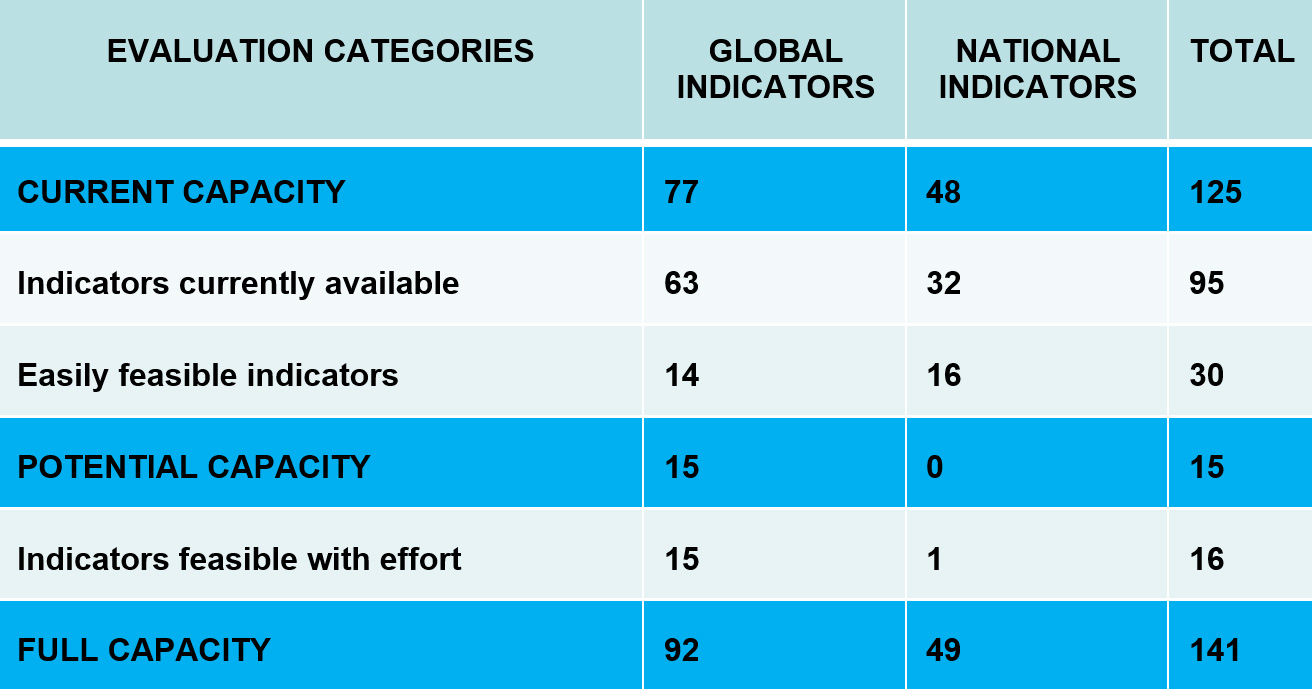
SDG reports and Voluntary National Reviews
In July 2020, Mozambique participated via webinar in the United Nations High Level Political Forum on Sustainable Development (HLPF) held in New York (virtually), under the auspices of the United Nations Economic and Social Council (ECOSOC), presenting its first Voluntary National Review.
The Mozambican delegation was headed by His Excellency Ambassador António Gumende, Resident Representative of Mozambique to the United Nations, accompanied by the staff of the Ministry of Economy and Finance, the Ministry of Foreign Affairs and Cooperation and the National Institute of Statistics.
Mozambique's presentation included a 12-minute video about the country and its engagement with Agenda 2030 and implementation of the SDGs and a presentation on (i) the country's commitment to Agenda 2030; (ii) the involvement of the different development actors; (iii) progress on the SDGs targets; (iv) the country's response to the COVID-19 pandemic and; (v) the main challenges in implementation.
The preparatory process for the Voluntary National Review involved a wide range of actors, including civil society, the private sector, academia, government and parliamentarians, and extensive reviews of government policies and programs and analysis of progress towards achieving the SDGs.
Mozambique’s VNR included a statistical annex to complement the report, produced by the National Institute of Statistics.
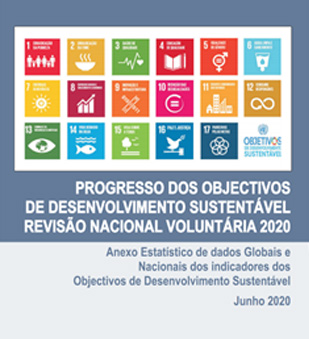
https://mozambique.opendataforafrica.org/sdg
To monitor progress toward the Sustainable Development Goals, Mozambique has chosen the Open Data Platform (ODP) developed and supported by the African Development Bank as its national dissemination platform for SDG data.
With the goal of operationalizing the platform, in March 2020, a training workshop was held for technical staff of the National Institute of Statistics (INE) and its Delegated Bodies (Ministries with substantial in-house statistical capacity) working on the SDGs. The workshop covered how to upload and modify data sets on the platform, how to create dashboards and visualizations and how to manage data sharing across the platform.
In the ongoing management of the platform, ministries and other SDG data producers will submit their data directly to the platform, and INE will be responsible for the validation and publication of the platform.
In September 2020, the Working Group on the dissemination and coordination of the SDGs in INE held a special virtual training for the presentation of the new data structure and the new metadata template. Leonilde Lima of the African Development Bank and Elena de Jesus of UNSD presented at the training, which was opened by Her Excellency, Dr. Elisa Monica Ana Magaua, President of the National Institute of Statistics.
During this technical meeting, the data of the indicators was harmonized and uploaded to the platform, and data visualization were created on the platform. Currently, it is possible to view 85 indicators on the platform (51 global and 34 national)
Overall coordination of National Statistical System
As per the current legislation, Law 7/96 of 5 July, the set of bodies responsible for the official statistical activity of the National Statistical System, includes the High Council of Statistics (CSE), the Coordinating Council of the General Population and Housing Census (CCRGPH), the National Institute of Statistics (INE) and the Bank of Mozambique (BM).
The High Council of Statistics is the body of the National Statistical System that oversees, guides and coordinates the NSS, while the National Institute of Statistics plays a leading role in its coordination and methodological orientation, as the executive organ of the National Statistical System. INE may delegate responsibilities, under its exclusive technical and methodological guidance to some Ministries, such as the Delegated Bodies of INE (ODINE), for the collection, production and publication of official statistics in their respective sectors.
To produce official statistics, the National Statistical System interacts with a variety of users and suppliers of information (Government, research institutions, private sector companies, investors, students, households, and cooperation partners) through the operationalization of the Strategic Plan of the National Statistical System, PE SEN -2020/2024, which establishes in its operational objective: 4.2.1: Ensure the statistical monitoring of the Government's Five-Year Program (PQG) and the country's international commitments (Agendas 2030 and 2063).
SDG data coordination committees
Overall responsibility for SDG monitoring and reporting for Mozambique lies with the Ministry of Economy and Finance (MEF), while INE plays a coordinating and technical role with regard to the collection, compilation, systematization and dissemination of data for the SDG indicators included in the National Indicator Framework, on the INE website and on the online dissemination platform.
Responsibility for SDG indicator compilation
INE officially delegates data collection and processing to eight ministries, which are responsible for delivering specified data sets to INE:
- Ministry of Health
- Ministry of Education and Human Development
- Ministry of Agriculture and Food Security
- Ministry of Public Works, Housing and Water Resources
- Ministry of the Sea, Inland Waters and Fisheries
- Ministry of Science and Technology, Higher Education and Professional Technical Education
- Ministry of Economy and Finance
- Ministry of Labor, Employment and Social Security
The strategic guidance with respect to data collection comes from the five-year strategic plans for the NSS developed by INE. INE also coordinates subsequent data dissemination to the public.
Data sharing between INE and the eight ministries which are official delegates of INE is mandated by the statistical law. At the operational level, INE is working to improve coordination and data sharing for the SDGs through the Open Data Platform dissemination portal for SDG data.
Actual data sharing mechanisms
Currently, data from line ministries is obtained in the form of printed publications and reports or via email in Excel or PDF format.
IV. Data availability and disaggregation
Work to allow more disaggregation
Since the finalization of the National Indicator Framework, work is underway in different ministries that produce indicators from administrative sources to reformulate data collection instruments to accommodate aspects related to disaggregation.
In October 2020, INE organized two seminars with the different ministries that are Delegated Organs of INE and other institutions that produce SDG indicators with the aim of harmonizing, systematizing, compiling and uploading metadata according to the SDG metadata template version 3.1, developed by UNSD. The opening session of the seminar with the Delegated Organs of INE was attended by Her Excellency, President of INE, Dr. Elisa Monica Ana Magaua.
Through the seminars, participants were trained on the he procedures to be used in completing the SDG metadata template. As a result, metadata for 98 SDG series was compiled and uploaded to the dissemination platform for the indicators with available data.
In October 2019, UNSD facilitated a national user engagement workshop in Mozambique, which was attended by staff members from INE and various line ministries involved in SDG data production and dissemination, as well as representatives of various user groups that make use of the data. The workshop demonstrated tools that the NSS can use to engage with users to enable it to better understand their needs and equip the NSS to better address them. Participants worked in groups to develop various sections of a user engagement strategy, which was endorsed by INE management and circulated to all members of the NSS for their feedback and endorsement.
Implementation plan and activities
The creation of a Statistical Information and Documentation Center is underway at INE, aiming to bring together all the statistical information available from the NSS and serve as the hub for engagement of data users. The center, still in its embryonic stage, will institute a user registration system for users to subscribe to statistical content and conduct user engagement activities.
As part of the project, Mozambique has put together an implementation plan for national activities, which includes such user engagement activities as: consultative meetings with users to assess their needs with regard to SDG monitoring, development and distribution of promotional materials on the SDGs and the national data platform, promotional campaigns and trainings on the use of the national data platform for SDGs that target various user groups.
1 Implementation, in this case, encompasses the entire exercise of integrating the 2030 and 2063 Agendas in the National System of Planning, dissemination and awareness-raising of the agendas at the national level, harmonization of policies and programs, as well as the preparation of Monitoring and Evaluation reports of national targets to be achieved by 2030.
